If you suffer from hay fever, you'll know how irritating it can be - sometimes even debilitating. When all your pals are outside having fun in the sun, it seems like you're tethered to the tissues and the antihistamines, desperately trying to feel normal.
But a GP has warned that it may not be hay fever you're suffering from. Instead, it could well be pollen food syndrome - a little-known reaction to raw fruit and vegetables.
One in 50 Brits suffer from it, and in most cases, it just causes a runny nose, sneezing, and itchy eyes - much like hay fever.

But in more serious cases, the allergy can cause more sinister side effects, Dr Sabah Salman warned, such as "nausea, vomiting, trouble swallowing, and breathing difficulties."
She said if you find yourself with those symptoms, you should "seek urgent medical treatment."
Food pollen syndrome, which can also be triggered by nuts, can mask itself as hay fever because it triggers a similar response in the body.
Dr Sabah, who works for LloydsPharmacy Online Doctor said: "Essentially, pollen food syndrome results when the immune system recognises the food protein you eat as an allergen and creates an allergic reaction, resulting in similar symptoms to hay fever."
Raw apples, fresh peaches, kiwis, hazelnuts, and almonds can also be triggers, and the GP said that most people with the condition will need to avoid at least four plant-based foods.

According to Dr Sabah, symptoms of the condition are usually mild and closely resemble hay fever, they include:
- Redness, mild swelling, or itching of the lips, tongue, inside of the mouth, soft palate, and ears
- Itching and mild swelling of the throat
- Abdominal pain, nausea, vomiting
- Sneezing, runny nose, or eye symptoms can also occur due to tiny amounts of the culprit foods entering the nose or eyes
But in more serious cases, the condition can cause anaphylaxis, which is a more severe reaction to an allergy.
Here, symptoms will include feeling lightheaded, dizzy or faint, fast or shallow breathing, wheezing, a fast heartbeat, clammy skin, confusion and anxiety, and even collapsing or losing consciousness.
Thankfully, generally, mild pollen food syndrome symptoms settle within an hour, without treatment.
If your symptoms are worrisome, take an antihistamine, but if you have and your symptoms are not improving, you should seek medical advice.
Do you suffer from food pollen syndrome? Email us: danielle.wroe@reachplc.com







